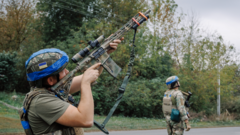As Easter unfolded, Ukraine’s President Volodymyr Zelensky has accused Russian forces of violating a temporary ceasefire meant to ease hostilities during the holiday, amidst a backdrop of continued violence along the front lines.
Ukraine Accuses Russia of Violating Easter Ceasefire Commitment

Ukraine Accuses Russia of Violating Easter Ceasefire Commitment
Tensions escalate as President Zelensky reports continued attacks despite declared truce.
With reports indicating that Russian troops unleashed nearly 450 artillery rounds and conducted numerous drone strikes since the truce was supposed to begin, President Zelensky remains firm on his stance that Ukrainian forces will respond in kind. Despite hopes for a peaceful respite, the reality on the ground paints a starkly different picture.
The conflict, now nearing three years, has seen multiple ceasefires attempted and often disregarded, leading many to question the sincerity of such declarations, particularly from the Kremlin. The latest ceasefire, announced only two hours prior to its start, appears to be politically motivated as Russia tries to communicate a willingness for peace amid international pressures.
President Putin’s announcement came after growing frustrations from the United States regarding Russia's reluctance to engage in meaningful ceasefire discussions. Ukrainian officials, while skeptical of Russian intentions, have maintained that any ceasefire would require a full cessation of hostilities from both sides.
In response to the ongoing aggression, President Zelensky reiterated that Ukrainian troops will mirror Russian actions, standing ready to defend against any incursions. The dynamics of this conflict continue to evolve, with world leaders closely monitoring developments.
As the situation unfolds, both sides face immense pressure from their respective populations and international observers, with hopes for a sustainable peace remaining distant.
As of now, the war continues to ravage the region, with casualties mounting and the humanitarian situation worsening.
Kim Barker is a Times reporter writing in-depth stories about the war in Ukraine.
The conflict, now nearing three years, has seen multiple ceasefires attempted and often disregarded, leading many to question the sincerity of such declarations, particularly from the Kremlin. The latest ceasefire, announced only two hours prior to its start, appears to be politically motivated as Russia tries to communicate a willingness for peace amid international pressures.
President Putin’s announcement came after growing frustrations from the United States regarding Russia's reluctance to engage in meaningful ceasefire discussions. Ukrainian officials, while skeptical of Russian intentions, have maintained that any ceasefire would require a full cessation of hostilities from both sides.
In response to the ongoing aggression, President Zelensky reiterated that Ukrainian troops will mirror Russian actions, standing ready to defend against any incursions. The dynamics of this conflict continue to evolve, with world leaders closely monitoring developments.
As the situation unfolds, both sides face immense pressure from their respective populations and international observers, with hopes for a sustainable peace remaining distant.
As of now, the war continues to ravage the region, with casualties mounting and the humanitarian situation worsening.
Kim Barker is a Times reporter writing in-depth stories about the war in Ukraine.






















